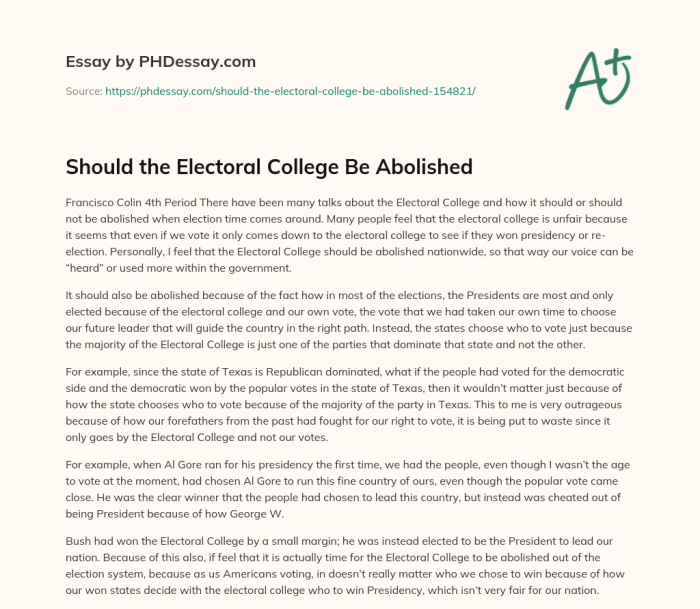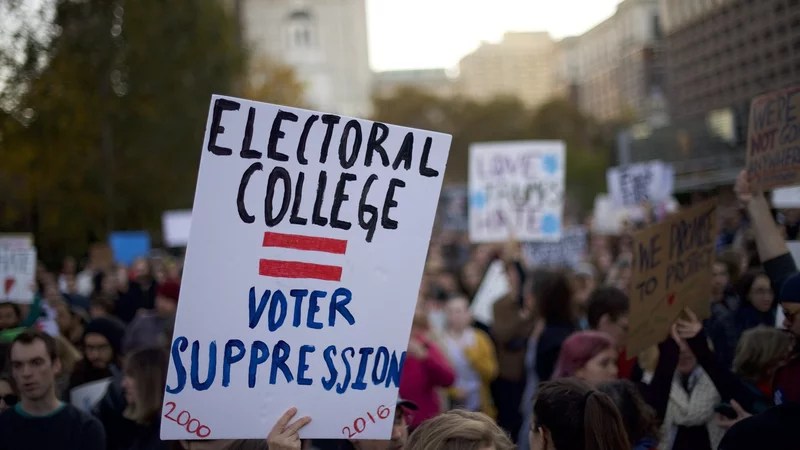Should the electoral college be abolished dbq – Should the Electoral College Be Abolished: A Comprehensive Analysis delves into the intricate debate surrounding the Electoral College, offering a comprehensive examination of its historical context, arguments for and against its abolition, proposed reforms, and public opinion.
This meticulously researched narrative unravels the complex tapestry of the Electoral College, shedding light on its origins, its impact on democracy, and the ongoing discussions about its relevance in the modern political landscape.
Historical Context: Should The Electoral College Be Abolished Dbq
The Electoral College was created during the Constitutional Convention of 1787 as a compromise between those who favored direct popular election of the president and those who preferred election by Congress. The system was designed to balance the interests of large and small states and to prevent a candidate from winning the presidency with only a plurality of the popular vote.
The Electoral College has been the subject of debate and controversy throughout its history. In 1824, Andrew Jackson won the popular vote but lost the presidency to John Quincy Adams in the Electoral College. This led to calls for the abolition of the Electoral College, but the system remained in place.
In 1876, Rutherford B. Hayes won the presidency despite losing the popular vote to Samuel J. Tilden. This election further fueled the debate over the Electoral College, and in 1887, Congress passed the Electoral Count Act, which established the procedures for counting electoral votes and resolving disputes.
Arguments for Abolishing the Electoral College

There are a number of arguments in favor of abolishing the Electoral College. One argument is that the system is undemocratic, as it allows a candidate to win the presidency without winning the popular vote. Another argument is that the Electoral College gives too much power to small states, as each state has the same number of electoral votes regardless of its population.
Additionally, the Electoral College can lead to situations where the winner of the popular vote does not win the presidency. This has happened five times in American history, most recently in 2016 when Donald Trump won the presidency despite losing the popular vote to Hillary Clinton.
Arguments for Retaining the Electoral College

There are also a number of arguments in favor of retaining the Electoral College. One argument is that the system protects the interests of smaller states. Without the Electoral College, candidates would only need to campaign in large states, and smaller states would have little say in the outcome of the election.
Another argument is that the Electoral College prevents the tyranny of the majority. If the president were elected by popular vote, it is possible that a candidate could win the presidency with only a small majority of the vote. This could lead to a situation where the president does not represent the views of the majority of Americans.
Finally, the Electoral College helps to ensure that the president is elected by a majority of the states. If the president were elected by popular vote, it is possible that a candidate could win the presidency with only a plurality of the vote.
This could lead to a situation where the president is not supported by a majority of the states.
Proposed Reforms to the Electoral College

There have been a number of proposals to reform the Electoral College. One proposal is to abolish the Electoral College and replace it with a direct popular vote. Another proposal is to keep the Electoral College but to award electoral votes proportionally based on the popular vote in each state.
There are advantages and disadvantages to each of these proposals. Abolishing the Electoral College would ensure that the president is always elected by the popular vote, but it could also lead to the tyranny of the majority. Keeping the Electoral College but awarding electoral votes proportionally would protect the interests of smaller states, but it could also lead to situations where the winner of the popular vote does not win the presidency.
Public Opinion on the Electoral College
Public opinion on the Electoral College is divided. A 2018 poll found that 47% of Americans favor abolishing the Electoral College, while 42% favor keeping it. Support for abolishing the Electoral College is highest among Democrats, while support for keeping it is highest among Republicans.
The Electoral College is a complex and controversial issue. There are strong arguments both for and against abolishing it. Ultimately, the decision of whether or not to abolish the Electoral College is a matter for the American people to decide.
Answers to Common Questions
What is the Electoral College?
The Electoral College is a body of electors chosen by voters in each U.S. state to cast electoral votes for the president and vice president.
Why is the Electoral College controversial?
The Electoral College has been criticized for giving disproportionate power to small states and for allowing candidates to win the presidency without winning the popular vote.
What are the arguments for abolishing the Electoral College?
Proponents of abolishing the Electoral College argue that it is undemocratic, gives too much power to small states, and can lead to the election of a president who did not win the popular vote.
What are the arguments for retaining the Electoral College?
Supporters of the Electoral College argue that it protects the interests of small states, prevents the tyranny of the majority, and ensures that all states have a say in the election of the president.
